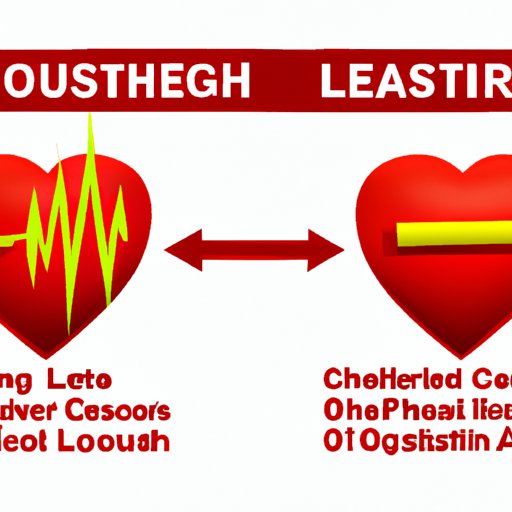
Introduction
High cholesterol is a common health condition that often goes unnoticed until it is too late. Cholesterol is a type of fat that is required by the body for various functions like producing hormones, vitamin D and aiding digestion. However, when an excessive amount of cholesterol builds up in the blood, it can lead to health problems like heart attacks and stroke.
Cardiovascular disease is one of the leading causes of death and disability globally. It is, therefore, important to understand the link between high cholesterol and cardiovascular disease. This article aims to provide comprehensive information on this topic for all those seeking to improve their heart health.

The Link Between High Cholesterol and Cardiovascular Disease: What You Need to Know
Cholesterol and cardiovascular disease are two distinct health conditions, but they are closely related. Cardiovascular disease refers to a group of health conditions that affect the heart and blood vessels, including heart attack, stroke, and peripheral artery disease (PAD). On the other hand, Cholesterol is a type of fat that is produced by the liver and circulates in the bloodstream. While cholesterol is necessary for vital body functions, excessive levels of cholesterol can lead to atherosclerosis, a build-up of fatty material in the arteries. Atherosclerosis causes the arteries to narrow and harden, reducing blood flow to the heart and brain and leading to cardiovascular diseases.
Understanding the Impact of High Cholesterol on Your Heart Health
When high cholesterol levels are not managed, they can cause damage to your blood vessels and lead to cardiovascular diseases like heart attacks and strokes. High cholesterol can lead to:
- Plaque build-up: Excessive cholesterol can cause the formation of plaque on the walls of the arteries, leading to atherosclerosis.
- Narrowing of the arteries: When the arteries narrow, the flow of blood to and from the heart is restricted, leading to cardiovascular diseases.
- Blood clots: When plaque build-up ruptures, it can cause a blood clot that can block blood flow and cause a heart attack or stroke.
Both high cholesterol and cardiovascular disease are often asymptomatic, meaning they do not exhibit any symptoms until the damage is done. The only way to know your cholesterol and cardiovascular health status is through regular check-ups and tests.
Myths and Facts About High Cholesterol and Cardiovascular Disease
There are many myths and misconceptions about high cholesterol and cardiovascular disease. Here are some common ones:
- Myth: Only the elderly are at risk of cardiovascular disease and high cholesterol.
- Fact: High cholesterol and cardiovascular disease can happen to anyone, regardless of age, gender, or ethnicity.
- Myth: Exercise will keep your cholesterol levels in check.
- Fact: While exercise can help manage high cholesterol levels, it is not enough on its own. A healthy diet, lifestyle changes, and, in some cases, medication are necessary to manage high cholesterol.
- Myth: You can feel high cholesterol and cardiovascular disease coming on.
- Fact: Most people do not show symptoms of high cholesterol and cardiovascular disease. Regular check-ups and tests are essential for early detection.
10 Habits to Improve Your Cholesterol and Prevent Cardiovascular Disease
Fortunately, there are several ways to manage high cholesterol and prevent cardiovascular disease. Here are ten habits that can help:
- Quit smoking: Smoking contributes to the hardening and narrowing of the arteries.
- Exercise regularly: Regular exercise helps manage weight, lower blood pressure and improve cholesterol levels.
- Eat heart-healthy foods: A diet rich in fruits, vegetables, fish, nuts, and whole grains can help improve cholesterol levels and reduce the risk of cardiovascular disease.
- Avoid trans and saturated fats: Foods that are high in trans and saturated fats increase cholesterol levels and contribute to heart disease.
- Lose weight: Maintaining a healthy weight can help in reducing high cholesterol levels.
- Manage stress: Stressful situations lead to increased heart rate, high blood pressure and contribute to cardiovascular disease.
- Drink alcohol in moderation: Excessive alcohol consumption increases your risk of developing high cholesterol and cardiovascular diseases.
- Get enough sleep: Inadequate sleep can cause an imbalance of hormones that can lead to weight gain and increase the risk of heart disease.
- Manage other health conditions: Conditions like high blood pressure, diabetes, and obesity can increase your risk of developing high cholesterol and cardiovascular disease, so it’s necessary to manage those conditions appropriately.
- Take prescribed medications: Cholesterol-lowering medications like statins, niacin, and fibrates are effective in reducing cholesterol levels.
New Research Reveals Strong Connection between High Cholesterol and Cardiovascular Disease
New research has found a strong connection between high cholesterol levels and cardiovascular disease. A recent study conducted by the American Heart Association (AHA) found that people who had higher levels of low-density lipoprotein (LDL) cholesterol, commonly known as “bad” cholesterol, were at a higher risk of stroke, heart attack, and other heart disease events. This study reinforces the importance of managing cholesterol levels to prevent heart diseases.
Life After a Cardiovascular Event: Managing High Cholesterol for Better Health
If you have previously suffered from a heart attack or stroke, it is essential to pay attention to your cholesterol levels. This involves making lifestyle changes and taking medications if necessary. Lifestyle changes like exercise, a healthy diet, and quitting smoking can help improve cholesterol levels. If these changes are not enough, medication may be prescribed to help lower cholesterol levels and prevent future cardiovascular events.
Dietary Changes to Lower High Cholesterol and Reduce the Risk of Cardiovascular Disease
Changing your diet can significantly reduce high cholesterol levels and the risk of cardiovascular disease. Some of the dietary changes that can lower high cholesterol include:
- Reduce saturated fat intake: Avoid foods that are high in saturated fats, such as meat, dairy products, and processed foods.
- Increase fiber intake: Foods such as fruits, vegetables, and whole grains are high in fiber and can help lower cholesterol levels.
- Choose healthy fats: Foods rich in healthy fats such as avocados, fish and nuts can improve cholesterol levels.
- Use plant-based protein sources: You can replace your meat dietary intake with plant-based protein sources like legumes, lentils and chickpeas.
- Consume leaner cuts of meat: When consuming meat, choose leaner cuts that are lower in saturated fat.
While changing your diet alone might not be enough to lower high cholesterol levels significantly, it can help in preventing other health complications and reduce the risk of cardiovascular disease
Conclusion
It is essential to understand the link between high cholesterol and cardiovascular disease. High cholesterol levels can lead to several cardiovascular diseases that can be fatal if not addressed promptly. Thankfully, there are lifestyle changes and medical interventions that can help manage high cholesterol and prevent heart diseases. You can lower your risk by making some simple changes to your life that includes exercising regularly, adopting a heart-healthy diet, managing stress, and quitting smoking. Take charge of your heart health today and seek professional treatment if necessary.





